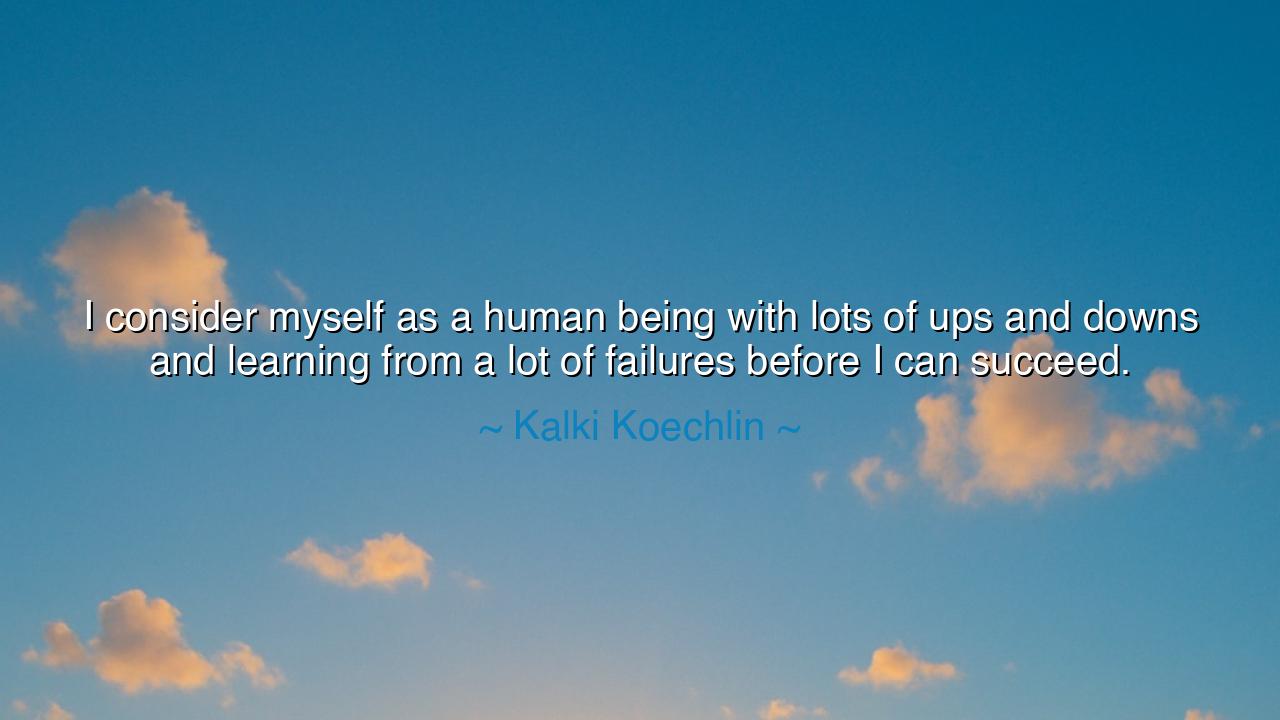
I consider myself as a human being with lots of ups and downs and
I consider myself as a human being with lots of ups and downs and learning from a lot of failures before I can succeed.






The words of Kalki Koechlin—“I consider myself as a human being with lots of ups and downs and learning from a lot of failures before I can succeed”—ring with the honesty of a soul that has tasted both joy and struggle. In this simple confession lies a profound truth that has echoed through every age: that failure is the teacher of greatness, and that no ascent is noble unless it rises from the valley of defeat. Kalki’s statement, though humble in tone, reflects an ancient rhythm of human growth—the eternal dance between falling and rising, between pain and understanding. She speaks as one who has looked within, and from her scars drawn strength.
The ancients knew this path well. The heroes of old were never those who walked a road of ease. Odysseus wandered for years across storm and sea, broken and tested, before he reached the shores of home. Gautama Buddha wandered through hunger, doubt, and darkness before awakening beneath the Bodhi tree. Their triumphs were born not of perfection, but of perseverance. So too does Kalki remind us that being human is to stumble often—and to rise again each time with greater clarity. The “ups and downs” she speaks of are not random tides of fate; they are the sculptor’s hands, shaping the spirit into something resilient, luminous, and wise.
There is a sacred power in admitting one’s flaws. In a world obsessed with success and appearance, to say “I am still learning” is an act of courage. Failure, in this view, is not shameful—it is sacred. It humbles the heart, tempers the ego, and opens the soul to wisdom. Like a blacksmith’s forge, it burns away what is brittle and leaves only what can endure. Each downfall teaches humility; each mistake reveals a hidden truth. In Kalki’s words, we hear the echo of the old philosophers who taught that self-knowledge is the highest form of victory, and that no external success can substitute for the triumph of inner understanding.
Kalki’s journey itself reflects this wisdom. Known for her daring roles and unflinching authenticity, she has faced criticism, rejection, and misunderstanding. Yet she never hid behind pretense. Her failures became her teachers; her vulnerability, her strength. Like the phoenix, she embraced the fire that would renew her. This is the essence of her quote: that to succeed is not to avoid falling, but to learn the art of rising. Each setback becomes a stepping stone, each wound a doorway to compassion.
History, too, bears witness to this truth. Consider Abraham Lincoln, who failed in business, lost elections, and faced deep depression—yet from these ashes rose the moral fire that would end slavery and unite a broken nation. Or Thomas Edison, who said he had not failed a thousand times, but found a thousand ways that did not work. Their triumphs were not miracles of luck, but of learning. They walked the same road Kalki describes: a path paved with failure, yet lit by perseverance.
The wisdom of her words reminds us that being human is not about perfection, but about persistence. To live is to fall and to rise, again and again, until the act of rising becomes the very nature of the soul. The greatest tragedy is not to fail—but to refuse to learn. The one who endures the storm and reflects upon it walks away with both courage and understanding. The one who hides from failure gains nothing but the illusion of safety.
Thus, the lesson is clear: embrace your humanity. When life casts you into darkness, do not curse the night—light a candle of reflection instead. When failure comes, do not turn away in shame—bend your ear to its quiet teaching. For every fall contains a fragment of truth, and every defeat carries the seed of future strength. Success is not a single peak to be reached, but a landscape of climbs and descents through which the soul learns its own measure.
In the end, Kalki’s words are not merely about herself—they are a mirror for us all. She reminds us that the path of growth is not a straight line but a spiral, ever circling through experience toward understanding. So let us walk boldly through our ups and downs, learning not to fear failure but to honor it. For it is through falling that we learn balance, through pain that we discover compassion, and through persistence that we touch the timeless truth: to be human is to learn endlessly, to fail deeply, and to rise unceasingly.






AAdministratorAdministrator
Welcome, honored guests. Please leave a comment, we will respond soon